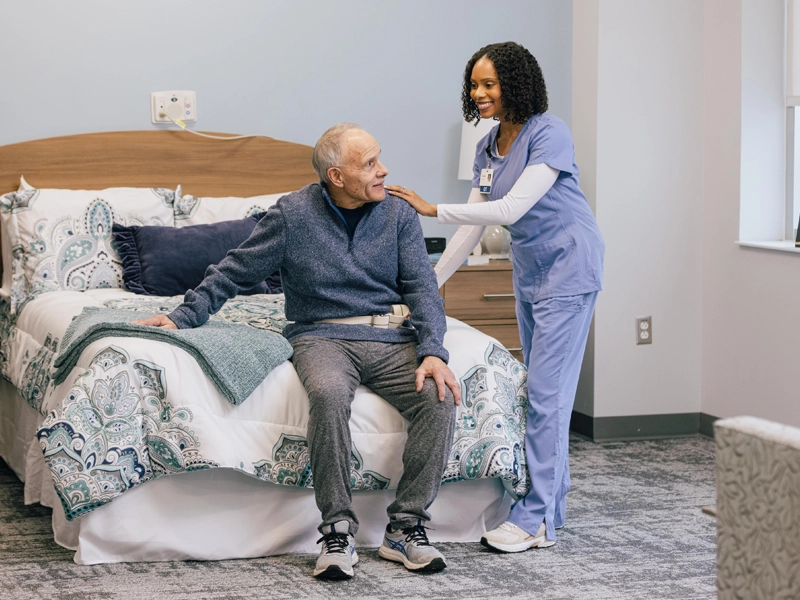Spinal Cord Injuries
Improve function, independence and overall well-being through our spinal cord injury program. Whether you have experienced a traumatic or non-traumatic spinal cord injury, our team can design a treatment plan with your unique needs in mind.
Why Choose Us for Spinal Cord Rehabilitation
Our Spinal Cord rehabilitation offers a comprehensive treatment plan for patients who have experienced a traumatic or non-traumatic spinal cord injury. We provide a specialized and coordinated process to amplify a patient’s physical, emotional, and psychological ability while maximizing their independence in self-care, activities of daily living, and mobility.
Our individualized program provides ongoing care for patients with the goal of returning home independently or with assistance from family members or other care providers. Rehabilitation that is initiated soon after a spinal cord injury helps improve skills and increase functional outcomes.
Spinal cord injury rehabilitation involves two essential processes:
- Restoration of functions that can be restored
- Learning how to do things differently when functions cannot be restored to pre-injury level
Our Rehabilitation Team
Our interdisciplinary rehabilitation team is committed to helping each patient and family progress to recovery. This specialized team evaluates and develops a personalized treatment plan designed to help each individual recover and develop the skills needed to return home and live as independently as possible.

The Spinal Cord Injury rehabilitation team includes:
- Patient/caregiver
- Physicians specializing in rehabilitation
- Rehabilitation nurses
- Physical therapists
- Occupational therapists
- Speech therapists
- Case managers/social workers
- Neuro/clinical psychologists
- Nutritional counselors
Rehab in an Inpatient Rehabilitation Hospital
Our Spinal Cord Injury program is a specialized inpatient rehabilitation program dedicated to providing expert and compassionate care for recovery after spinal cord injury. It focuses on the physical and emotional effects of your injury with the goal of helping you recover to your maximum potential.
- Physical therapy focuses on exercise routines designed to strengthen and maintain existing muscle function. Our physical therapists will also help you learn how to use any required mobility devices.
- Occupational therapists help you learn techniques for managing self-care activities such as dressing, bathing as well as everyday activities such as home management. They will also provide instruction for equipment that will help you better perform these activities.
- Speech therapists provide training regarding breathing and swallowing.

The program focuses on:
- Teaching adapted activities of daily living (ADLs)
- Managing bowel and bladder control
- Addressing any social issues
- Improving psychological adjustment
- Promoting a positive self-image
- Maximizing your overall mobility, health and independence
Caregiver Support
We know the critical role caregivers and family members play in helping their loved ones recover from a spinal cord injury. We also know it can be stressful at times. Our care team offers support and information to help caregivers and other loved ones understand the recovery process after a spinal cord injury and how to best help their loved one. They also help direct caregivers to the right resources so they can get help and support when they need it.
Community Resources
UW Health Rehabilitation Hospital has an ongoing relationship with the Madison Spinal Cord Injury group. Our therapist will work with our patients to pair them with a trained peer mentor, if appropriate. Many times, having the ability to connect with a spinal cord injury survivor can benefit our new patients.
Spinal Cord Injury Information
UW Health Orthopedics and Rehabilitation: Spinal Cord Injury (SCI)
Living with a Spinal Cord Injury


